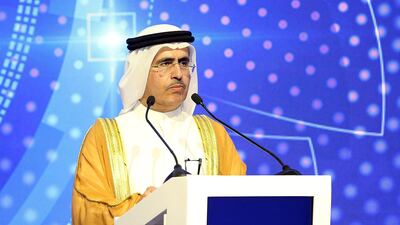On Friday, protests in Melbourne and Sydney kicked off a day of global strikes that saw students around the world demanding action to prevent further global warming and climate change.
At a time when talk on climate change is rife, Saeed Mohammed Al Tayer, emphasised the UAE’s efforts in producing clean energy to preserve further damage to the environment.
In a thought leadership piece released via the state news agency Wam, the vice chairman of Dubai Supreme Council of Energy and CEO of Dubai Electricity and Water Authority (Dewa), said Dewa is proud to be "the first to adopt the usage of clean energy technologies" in the UAE.
“There has been a global boom in the manufacture and usage of photovoltaic (PV) solar panels in recent times,” he wrote.
“Very soon, we will use PV in additional areas including in the infrastructure we use every day, as well as in our home and office windows, to convert solar energy into electricity.
“Our buildings will soon become self-sufficient to produce clean energy while preserving the environment.”
Calling the past decade the "era of PV", he said research and development centres are racing to find sustainable solutions to improve efficiency to offer the best solutions for end-users.
Making reference to the Mohammed bin Rashid Al Maktoum Solar Park, the world’s largest single-site project to generate renewable energy, Al Tayer said Dewa fully supports the vision of Sheikh Mohammed bin Rashid, Vice President and Prime Minister of the UAE and Ruler of Dubai, in shifting towards a "green economy".
“[The solar park] will have a capacity of 5,000 megawatts (MW) by 2030 with investments of Dh50 billion,” he wrote.
“Through its projects, the solar park will accelerate the shift towards adopting and using solar energy.”
With the support of Dubai Supreme Council of Energy, Dubai Municipality, Dubai Police, and the Mohammed Bin Rashid Housing Establishment, Al Tayer said Dewa is consistently working to issue regulations, which focus on the integration of consumption rationalisation technology and energy production in all buildings by 2030.
“We are developing an integrated programme to build a comprehensive system that allows at least a tenth of our citizens’ homes to be self-sufficient in terms of water, food, and energy,” he wrote, citing efforts to help achieve the goals set out by Sheikh Mohammed bin Rashid in the UAE’s ‘50-Year Charter’.
“The achievement of this goal will help change lifestyles and contribute to the preservation of our environment.
“We aim to create a new economic sector that supports energy, water, and food self-sufficiency.”
To achieve the objectives of the ambitious and integrated Dubai Clean Energy Strategy, that aims to generate 75 per cent of its energy consumption from clean sources by 2050, Al Tayer ended with a clear message.
“Our continuous efforts will transform Dubai into a global hub for clean energy and green economy, with the lowest carbon footprint in the world; and establish sustainability as a roadmap for a brighter and happier future for Dubai.”

